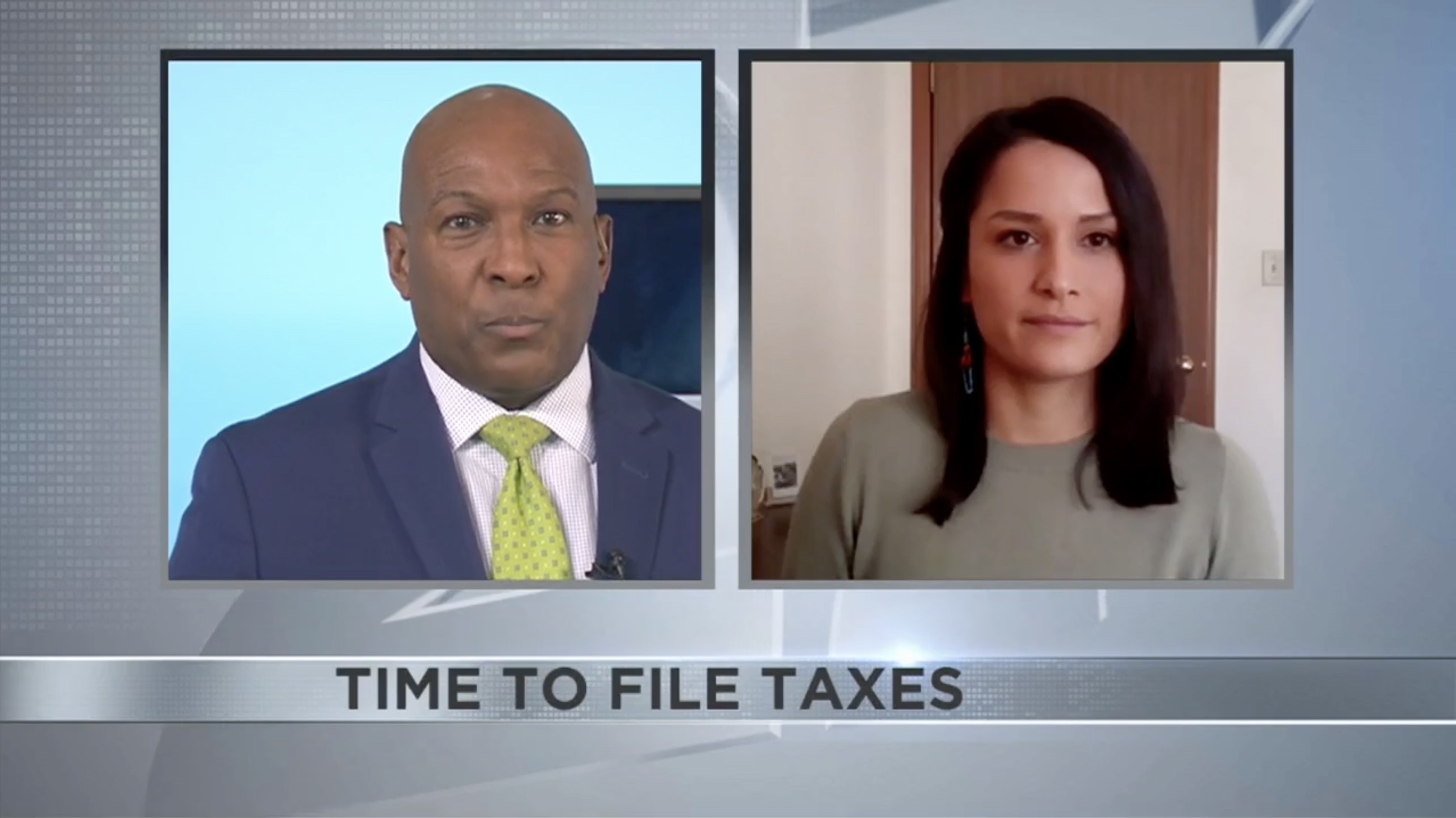Share
The start of tax season officially kicked off on January 24th. Atlatl’s Director of Financial Planning, Audrey Blanke was recently interviewed by WKOW Madison to share insights on how 2021 returns may be different than in the past.
IRS now accepting tax returns. What to know before filing your return.
Tax season has arrived.
If it feels like it is earlier than last year, that’s because it is. In fact, it’s 17 days earlier, to be exact.
The Internal Revenue Service started accepting and processing 2021 tax returns on Monday, January 24th, except you might not have everything you need in order to file yet.
Although the deadline is months away, it is never too early to gather your paperwork, focus on some of your tax challenges, and prepare to get the job done.
This year it’s essential to brush up on some new requirements and make sure you have the correct facts and figures to file an accurate return. A wrong number could mean a long delay.
As you begin to collect your documents, pay attention to some key issues for this filing season:
- Longer processing times,
- Advance Child Tax Credit Payments
- The Recovery Rebate Credit
- Account contributions for 2021
- Special charitable contribution deduction
- How jobless benefits will be treated compared to 2020 returns
- More tips and reminders
Will there be tax delays due to COVID?
The IRS is warning that a resurgence of COVID-19 infections on top of less funding authorization from Congress than the Biden administration had requested could make this filing season particularly challenging. Like we experienced last year, it’s safe to assume that the IRS will have an extended turnaround time between when you file and when you receive a refund. If you want to avert processing delays, it is best to file electronically, especially this year.
How can you get more money for the child tax credit? Do I need IRS letter 6419 to file?
Perhaps the one item that has the greatest potential to cause some confusion is the expanded child tax credit. In early 2021, Congress passed the American Rescue Plan Act (ARPA), which served to extend key provisions of the initial COVID-relief bills and offer new opportunities to help families. The expanded child tax credit took a new shape by being paid out in advance, instead of waiting until the following spring to claim credit. In other words, starting in July a lot of families started to receive a monthly check deposited by the IRS into their bank accounts for this credit. The good news is that the payments are not taxable (credits function to lower your tax bill). The bad news is that only part of the credit was paid out. If you want to receive the full credit, you will need to follow a series of steps (hopefully with their tax professional’s help!) to claim the rest. In December, the IRS started issuing Letter 6419, which reports the amount the taxpayer received for their children. Don’t lose this document! You’ll need it to claim the rest of the credit. If you have not received the letter or have other questions, consider referencing this IRS Topical Q&A.
For those that had a new baby in 2021 and did not receive any advance payments, it’s likely you’ll get a bigger refund this year compared to previous years, since the full credit will show up on your return.
Some families may want to hold off a bit when it comes to filing a return until they spot the IRS letter 6419, which can help them file an accurate return and avoid delays. Others who don’t want to wait may need to review their own records and check their specific information at the “Child Tax Credit Update Portal Site” at IRS.gov/ctcportal.
Are there IRS tax stimulus checks for 2022? Perhaps with Recovery Rebate Credit.
Some people might want to file returns even though they’re not required to do so to claim a Recovery Rebate Credit or the 2021 stimulus payments.
According to the IRS, individuals who didn’t qualify for a third Economic Impact Payment or got less than the full amount may be eligible to claim the Recovery Rebate Credit. For those who got some money, the IRS says you’ll need to know the total received to calculate the correct rebate credit to avoid processing delays.
The IRS will send Letter 6475 starting in late January with the total amount of the third Economic Impact Payment received. Economic impact payment amounts also can be viewed on IRS online accounts.
Can I still make account contributions for 2021?
The buzzword for the final quarter of 2021 was without a doubt, “inflation”. From grocery stores to gas stations, most areas of our lives were impacted by the rising prices; however, the impact of inflation is felt differently by different consumers, based on their lifestyle and income level. For those on a limited budget, perhaps working part time as they phase into retirement or balancing work with higher education, inflation may have impacted the amount you were able to save. The good news is that there is still time to make contributions and see that tax benefit on your 2021 tax return.
Individual retirement accounts are a great way to put away extra dollars and claim a tax deduction for those with Adjusted Gross Income (AGI) below $125,000 for married couples filing jointly.
For those individuals and families with a high deductible health plan, you might also consider maximizing your contribution to your Health Savings Account (HSA) to get an additional tax benefit. HSA’s are unique because you receive tax benefits up front on the contribution and upon distribution. Think of it like a combination of a Traditional IRA and a Roth IRA.
Finally, one often-over looked option comes to us at the state level: 529 Education Savings plans. If you have children or grandchildren (or nieces and nephews), you can likely contribute into their 529 plan and receive a tax deduction for 2021 (note: treatment depends on your state and where the 529 is set up).
Don’t forget about a charitable deduction!
Typically, most people aren’t able to get a tax break when they donate money to a charity if they’re claiming the standard deduction on their federal income tax returns.
Today, nearly 9 out of 10 taxpayers take the standard deduction.
But those who do not itemize have a special tax break for money that they donated in 2021.
On 2021 returns, a married couple taking the standard deduction is allowed to claim up to $600 for cash contributions made to qualifying charities in 2021, if filing a joint return.
A single individual, including married individuals filing separate returns, can claim a deduction of up to $300 for cash contributions.
See Line 12b on the front of the 1040 form for 2021 for those who take the standard deduction, and make sure you have receipts or other documentation available when you go to file.
Will unemployment benefits come with a tax break in 2022?
Unlike last year, a special tax break doesn’t exist for up to $10,200 of unemployment benefits. The temporary tax break applied only for those with modified adjusted gross incomes (MAGI) of less than $150,000 in 2020 and those who also received unemployment benefits last year.
This year, jobless benefits received in 2021 will be taxable on the 2021 federal income tax return.
When is the tax filing deadline in 2022?
The deadline to file 2021 income tax returns is Monday, April 18, for most people, three days later than the normal April 15 deadline for filing taxes.
The later date is a result of the Emancipation holiday in the District of Columbia. By law, Washington, D.C., holidays affect tax deadlines for everyone the same way federal holidays do. Taxpayers who live in Maine or Massachusetts have until April 19 to file because of a holiday celebrated in those states, Patriots’ Day.
The IRS has extended the deadline until May 16 for victims of the late 2021 Colorado wildfires as well as victims of the December tornadoes in parts of Illinois, Kentucky, and Tennessee. The extension applies to various individual and business tax returns and tax payments deadlines.
When should I receive my 2021 W-2 by?
W-2’s are due to be mailed no later than January 31st.
What is the deadline for filing a tax extension?
April 18 also is the deadline for requesting an extension, which gives taxpayers until Oct. 17 to file their returns for 2021.
Do I qualify for IRS Free File?
If your adjusted gross income was $73,000 or less in 2021, you can use free tax software to prepare and electronically file your tax return, according to IRS instructions online for the 2021 tax season.
Taxpayers who earned more can use Free File Fillable Forms, the electronic version of the federal tax forms, to file their tax returns online. Go to IRS.gov to learn more.
When should I expect my tax refund in 2022?
The IRS anticipates most taxpayers will receive refunds, as in past years. Most should receive them within 21 days of when they file electronically if they choose direct deposit (and there are no problems with their returns). Last year’s average federal refund was more than $2,800.
However, by law, the IRS can’t issue refunds involving the Earned Income Tax Credit or the Additional Child Tax Credit before mid-February, though taxpayers still may file earlier than that.
Can I track my refund with the ‘Where’s My Refund’ tool like in the past?
The IRS says using “Where’s My Refund?” on IRS.gov/refunds and the IRS2Go mobile app are the best ways to check the status of a refund. You can check the status within 24 hours after they receive your e-file return or four weeks after you’ve mailed a paper return.
More Important Tips and Reminders
In terms of what to expect for this filing season, there are a few reminders that we’re sharing with clients.
First, make sure to wait to get documents from all custodians you may have worked with during the year. If you switched firms, expect to get 1099s from the prior custodian and the new custodian, if transactions at both institutions occurred (contributions, trades, distributions, etc.).
For those with holdings in cryptocurrency, you will need to report transactions in order to determine capital gains or losses. Tax treatment for alternative investments like cryptocurrency can be complicated, so we strongly advise working with a tax professional to ensure proper accounting.
Have tax questions? Ask us!
For most, taxes are synonymous with spring, but at Atlatl Advisers we view tax planning as a year-round sport. This year we’ll be keeping a close eye on proposed tax and estate legislation, some of which could directly impact items mentioned above. If you have questions or would like a review of your return after filing, please do not hesitate to get in contact with the Atlatl team.
















